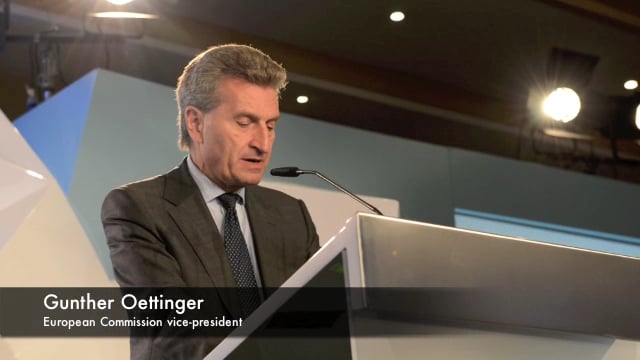‘Malta a bridge to south, east Mediterranean’, EC vice-president says on gas supply
EU has vital interests in the South and East Mediterranean regions and Malta is a bridge, says European Commission vice-president Günther Oettinger.


The European Union has vital interests in the South and East Mediterranean regions and Malta and Cyprus were the bridges, European Commission vice-president Günther Oettinger said.
Addressing the closing speech of the first day of the Energy Conference, Oettinger said stability in North Africa and the Eastern Mediterranean was important for the European Union.
“For the EU, stability in the region is important for our own security as volatility, rivalry and unrest could spill over into the EU. Security of gas supply is of particular mutual interest and reinforcing the regional trade in gas would be of significant benefit to gas producers and consumers in the EU, North Africa and the Middle East,” Oettinger said.
The EU is looking for a further diversification of gas supply sources and routes: the North African and East Mediterranean countries are looking to develop their economies and to meet increased domestic energy demand. This presents good opportunities for cooperation with the EU.
The Energy Conference in fact saw key stakeholders referring to the well of gas energy sources that countries like Algeria, Egypt and Libya offered to Europe.
According to Gadalla H. Gadalla, board member of Libya’s National Oil Company, the North African country enjoyed 55 trillion cubic feet (TCF) of natural gas reserves.
Libya is looking forward to enhance its cooperation with Europe, but first its Oil and Energy Ministry was working on formulating a new strategy and legal framework.
Libya was also looking at international frameworks and models of contracts to obtain maximum value of its hydrocarbon resources.
But for Libya to be able to start exporting, it must regain its full potential in production and recover its capabilities and full control of ports. Infrastructure maintenance and developing new refineries is required.
Algeria is considered a key partner for the EU as Europe is by the far the biggest customer of Algeria.
The discovery of gas in the Eastern Mediterranean and the vast un-tapped reserves in North Africa provide huge opportunities for the EU.
The European Union currently imports 53% of the energy it consumes and is dependent on external suppliers for crude oil – nearly 90% is imported – natural gas, solid fuels and nuclear fuels.
Europe’s external energy bill today represents more than €1 billion per day and more than a fifth of total European imports.
Oettinger said Europe needed to achieve a better functioning and a more integrated energy market. The European Commission is now proposing that by 2030, member states should be on track to meet a 15% interconnection target.
“LNG will be an important flexibility element and we need to better use our existing and future regasification capacities. We also need a reinforced partnership with Norway, the acceleration of the Southern Gas Corridor and the promotion of a new gas hub in Southern Europe,” the EC’s vice-president said.
Malta is taking the opportunity to promote itself as an energy hub, arguing that is position in the heart of the Mediterranean with strong links to both the European Union and the Northern African region made it perfectly placed to take a leading role in this.
Gas discoveries in the Mediterranean region have a direct impact on EU’s energy security.
“We take a particular interest in proposals for transporting East Mediterranean gas into the EU,” Oettinger said. “Greater diversity in gas supplies is an important goal of our policies.”
The wider region of the Eastern Mediterranean will be part of a new corridor between Europe and the Caspian. The Southern Corridor will bring gas from Azerbaijan to Europe by 2019.
Oettinger reiterated his support to the establishment of routes that will enhance the energy security of gas supply of both the EU and the non-EU south and east Mediterranean countries.
During his intervention, the EC’s vice-president spoke highly of the energy relations with Egypt, Israel, Turkey, Lebanon , Jordan and Palestine.
“With Libya, the EU has been an important oil and gas trading partner in the near past. We hope the trade in gas will gradually resume,” Oettinger said.








.jpeg)
.jpg)









